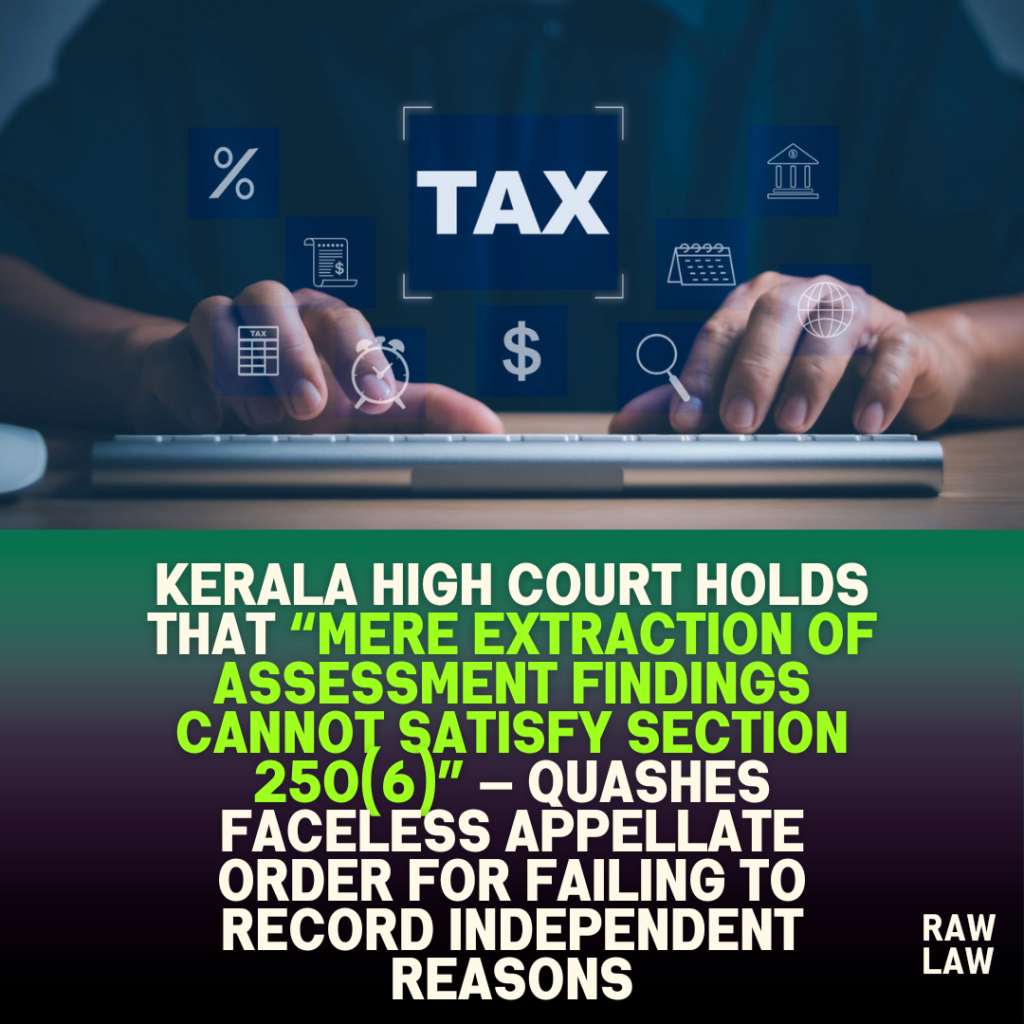Court’s decision
The Kerala High Court, per Justice Ziyad Rahman A.A., set aside the faceless appellate order issued by the First Appellate Authority under the Income Tax Act after holding that the appellate authority failed to comply with the mandatory requirements of Section 250(6). The Court observed that the impugned order merely reproduced the findings of the assessment order and focused primarily on the assessee’s alleged non-appearance, without independently addressing the points for determination or offering its own reasoned conclusions.
The Kerala High Court held that such mechanical disposal defeats the statutory regime governing first appeals. Relying on its earlier judgment in Anandan N. v. Commissioner of Income Tax (Appeals), the Court reiterated that an appellate authority is duty-bound to provide clear findings on each ground raised. Accordingly, the Court quashed the impugned order and directed the appellate authority to reconsider the appeal afresh and pass a reasoned order after affording the assessee a proper hearing. The direction mandates expeditious disposal, emphasising transparency and accountability in faceless appeal mechanisms.
Facts
The petitioner, an assessee registered under Section 12A of the Income Tax Act, challenged an order passed by the assessing authority for the year 2014-15. After receiving the adverse assessment, the petitioner pursued a statutory first appeal before the appellate authority. The appeal was dismissed on the ground that the petitioner did not appear during the appellate proceedings. The impugned order contained extensive extracts from the original assessment but did not independently evaluate the grounds raised by the petitioner.
In response, the petitioner invoked the writ jurisdiction of the High Court under Article 226, contending that the appellate authority failed to comply with mandatory statutory requirements under Section 250(6) of the Income Tax Act.
Issues
Kerala High Court’s Role in Ensuring Fairness
The primary issue before the Kerala High Court was whether the First Appellate Authority’s order satisfied the statutory mandate under Section 250(6), which requires a written order stating the points for determination, the decision on each point, and the reasons for such decision. The secondary issue was whether the appellate authority could dismiss an appeal solely based on non-appearance, without independently examining the grounds raised.
Petitioner’s arguments
The petitioner argued that the order of the appellate authority was legally unsustainable because it failed to address any of the grounds raised in the appeal. The petitioner submitted that Section 250(6) mandates a reasoned order explaining the determination of each issue, which the appellate authority ignored. The petitioner asserted that even if the assessee is absent, the appellate authority cannot dismiss an appeal mechanically but must adjudicate on merits. It was further argued that the order merely reproduced the assessment findings and lacked any independent reasoning, violating principles of natural justice and statutory obligations.
Respondent’s arguments
The respondents contended that the appeal was rejected because the petitioner failed to appear despite opportunities. They argued that the appellate authority examined available documents and found no basis to differ from the assessment. According to the respondents, the absence of the petitioner justified affirming the assessment. They maintained that since the assessment order already contained detailed findings, the appellate authority was entitled to adopt the same. They further submitted that the impugned order could not be deemed violative of Section 250(6) solely because the assessee chose not to participate.
Analysis of the law
Section 250(6) of the Income Tax Act contains a clear and compulsory duty: the appellate order must (i) identify the points for determination, (ii) record decisions on each point, and (iii) provide reasons for those decisions. This statutory requirement ensures that the appellate process is not an empty formality but a genuine merits-based reconsideration. The High Court emphasized that the appellate authority’s task is not to parrot assessment findings but to independently evaluate the grounds raised.
The Court reiterated that non-appearance of an assessee cannot obviate the appellate authority’s statutory obligation. While procedural defaults may affect the depth of assistance available, they do not empower the authority to bypass statutory duties or issue non-speaking orders.
Precedent analysis
The High Court relied on its judgment in Anandan N. v. Commissioner of Income Tax (Appeals), where it held that an appellate order lacking reasons violates Section 250(6). In that case, too, the appellate authority reproduced assessment findings without independent analysis, prompting judicial interference. By referencing this precedent, the Court reaffirmed the principle that reasoned orders are indispensable components of the appellate structure.
The Court also drew upon general jurisprudence requiring speaking orders in quasi-judicial proceedings, reinforcing that transparency and accountability are fundamental to tax administration.
Court’s reasoning
The Court held that the impugned order merely recited the assessment findings and included an observation regarding non-appearance. No point for determination was independently identified, nor did the order contain any analysis of the grounds raised. The statutory obligation under Section 250(6) was therefore not fulfilled.
The Court emphasised that faceless procedures cannot dilute statutory safeguards. It held that the appellate authority must exercise its mind independently rather than acting as a rubber stamp. The absence of the appellant may limit submissions, but the authority must still apply legal standards and provide a reasoned determination. Since these requirements were not met, intervention under Article 226 was warranted.
Conclusion
The High Court set aside the impugned order, holding it contrary to Section 250(6). It directed the First Appellate Authority to reconsider the appeal afresh, issue a reasoned order based on merits, and provide an opportunity for hearing. The decision underscores the judiciary’s insistence on procedural fairness and non-mechanical application of the faceless appeal system.
Implications
The judgment reinforces that statutory safeguards in appellate proceedings remain non-negotiable, even in faceless or digital frameworks. Appellate authorities must provide structured reasoning and address each ground raised. The ruling protects taxpayers from summary dismissals and strengthens accountability within the tax administration. It also signals that writ courts will intervene when authorities fail to comply with statutory mandates, ensuring balance between administrative efficiency and procedural fairness.



